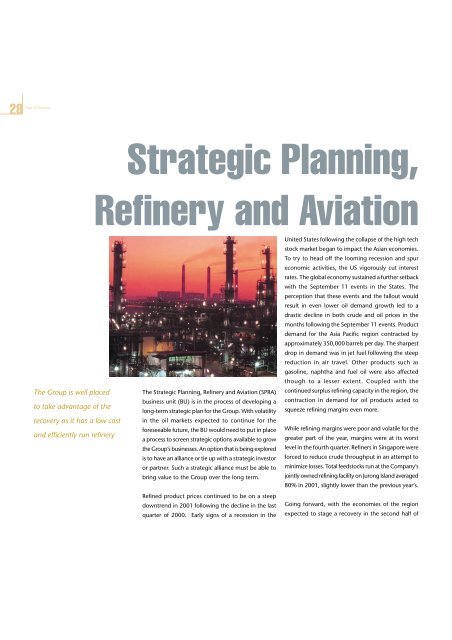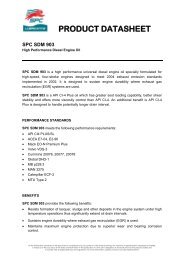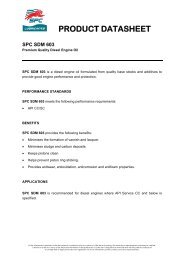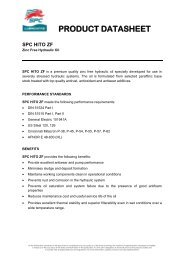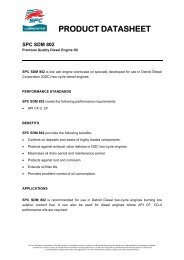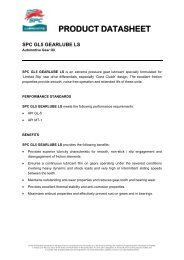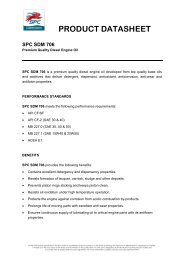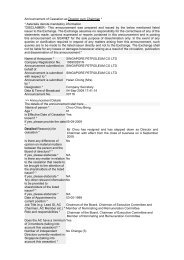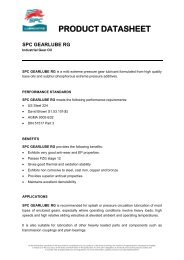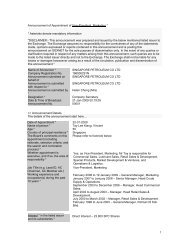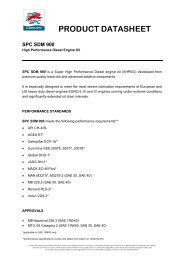Strategic Planning, Refinery and Aviation - SPC
Strategic Planning, Refinery and Aviation - SPC
Strategic Planning, Refinery and Aviation - SPC
Create successful ePaper yourself
Turn your PDF publications into a flip-book with our unique Google optimized e-Paper software.
28<br />
Year in Review<br />
<strong>Strategic</strong> <strong>Planning</strong>,<br />
<strong>Refinery</strong> <strong>and</strong> <strong>Aviation</strong><br />
The Group is well placed<br />
to take advantage of the<br />
recovery as it has a low cost<br />
<strong>and</strong> efficiently run refinery<br />
The <strong>Strategic</strong> <strong>Planning</strong>, <strong>Refinery</strong> <strong>and</strong> <strong>Aviation</strong> (SPRA)<br />
business unit (BU) is in the process of developing a<br />
long-term strategic plan for the Group. With volatility<br />
in the oil markets expected to continue for the<br />
foreseeable future, the BU would need to put in place<br />
a process to screen strategic options available to grow<br />
the Group’s businesses. An option that is being explored<br />
is to have an alliance or tie up with a strategic investor<br />
or partner. Such a strategic alliance must be able to<br />
bring value to the Group over the long term.<br />
Refined product prices continued to be on a steep<br />
downtrend in 2001 following the decline in the last<br />
quarter of 2000. Early signs of a recession in the<br />
United States following the collapse of the high tech<br />
stock market began to impact the Asian economies.<br />
To try to head off the looming recession <strong>and</strong> spur<br />
economic activities, the US vigorously cut interest<br />
rates. The global economy sustained a further setback<br />
with the September 11 events in the States. The<br />
perception that these events <strong>and</strong> the fallout would<br />
result in even lower oil dem<strong>and</strong> growth led to a<br />
drastic decline in both crude <strong>and</strong> oil prices in the<br />
months following the September 11 events. Product<br />
dem<strong>and</strong> for the Asia Pacific region contracted by<br />
approximately 350,000 barrels per day. The sharpest<br />
drop in dem<strong>and</strong> was in jet fuel following the steep<br />
reduction in air travel. Other products such as<br />
gasoline, naphtha <strong>and</strong> fuel oil were also affected<br />
though to a lesser extent. Coupled with the<br />
continued surplus refining capacity in the region, the<br />
contraction in dem<strong>and</strong> for oil products acted to<br />
squeeze refining margins even more.<br />
While refining margins were poor <strong>and</strong> volatile for the<br />
greater part of the year, margins were at its worst<br />
level in the fourth quarter. Refiners in Singapore were<br />
forced to reduce crude throughput in an attempt to<br />
minimize losses. Total feedstocks run at the Company’s<br />
jointly owned refining facility on Jurong Isl<strong>and</strong> averaged<br />
80% in 2001, slightly lower than the previous year’s.<br />
Going forward, with the economies of the region<br />
expected to stage a recovery in the second half of
Year in Review<br />
29<br />
With the economies of the region<br />
expected to stage a recovery in the<br />
second half of 2002, there are signs<br />
that dem<strong>and</strong> for oil may improve<br />
2002, there are signs that dem<strong>and</strong> for oil may<br />
improve. The Group is well placed to take advantage<br />
of the recovery as it has a low cost <strong>and</strong> efficiently run<br />
refinery.<br />
In aviation sales, <strong>SPC</strong> managed to maintain its market<br />
share of around 19% of jet fuel sales at Singapore<br />
Changi Airport. Changi recorded an average<br />
throughput of approximately 73,200 barrels per day<br />
for 2001, about 3.1% higher than the previous year.<br />
This was despite passenger <strong>and</strong> air traffic volume in<br />
the Asia Pacific region suffering a double-digit decline<br />
in the aftermath of the September 11 events. Jet fuel<br />
volumes registered a marginal decline of 2.5% after<br />
the September 11 events due to a cutback in air<br />
flights through Changi. Interestingly, the decline was<br />
not steeper given the airlines’ decision to maximize<br />
their fuel off takes from Changi for reasons<br />
of economy, security <strong>and</strong> quality.<br />
Notwithst<strong>and</strong>ing the changes <strong>and</strong> recent<br />
development in the aviation industry, <strong>SPC</strong> continues<br />
to be a quality <strong>and</strong> competitive supplier of jet fuel at<br />
Changi. Reflecting its strengths in the market, <strong>SPC</strong><br />
secured five new jet fuel supply contracts at Changi,<br />
bringing the total number of airlines served to 23 in<br />
2001.<br />
At Taipei’s Chiang Kai Shek International Airport, <strong>SPC</strong><br />
supplied more than 30% of the jet fuel to<br />
foreign airlines at<br />
this air hub.<br />
At the Hong Kong<br />
International<br />
Airport,<strong>SPC</strong><br />
volumes for 2001 of<br />
2,900 barrels per<br />
day were slightly<br />
higher than the<br />
volumes for 2000<br />
due mainly to higher<br />
off takes by its<br />
existing customers.<br />
For 2002, the<br />
outlook for jet fuel<br />
sales is mixed. A drop in volume at Changi in the<br />
first quarter is expected as some major airlines have<br />
announced their intention to reduce flights. Airlines<br />
are however taking concerted action through tighter<br />
security measures <strong>and</strong> attractive ticket discounting<br />
to restore passenger traffic back to the pre-<br />
September level. Despite such efforts, it is<br />
envisaged that jet fuel volume at Changi is unlikely<br />
to be maintained at the 2001 levels. It would take<br />
some time to restore confidence in air travel<br />
hence industry opinion is that jet fuel volumes<br />
in Singapore is expected to show a slight decline<br />
of 3% to 5% for 2002.<br />
<strong>SPC</strong> continues to be<br />
a quality <strong>and</strong> competitive<br />
supplier of aviation fuel


